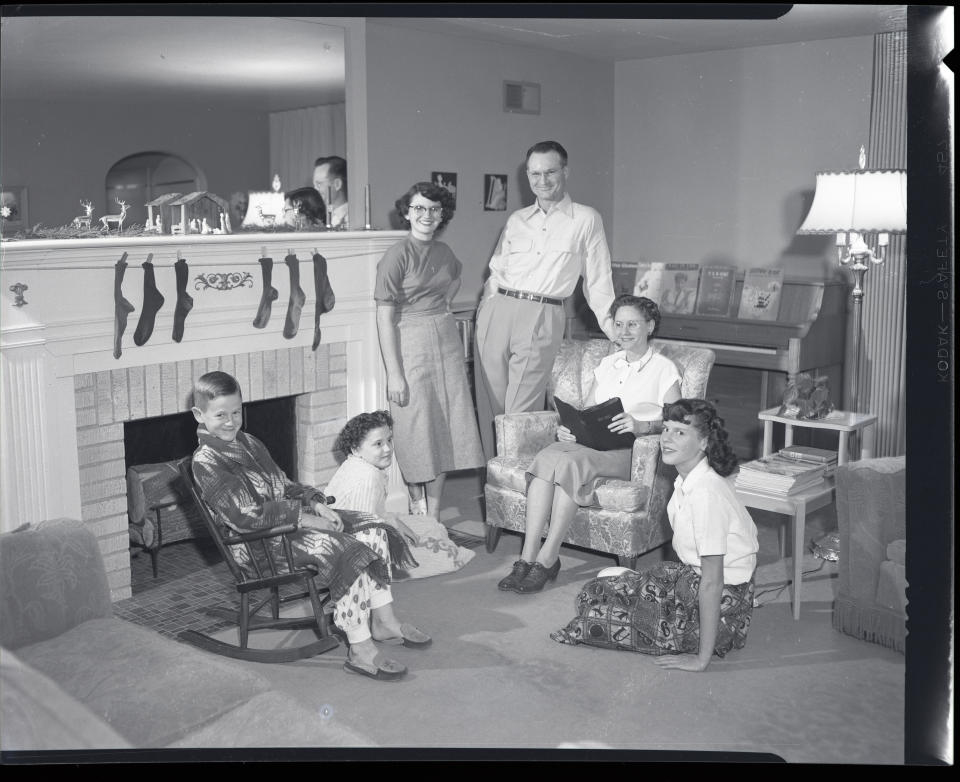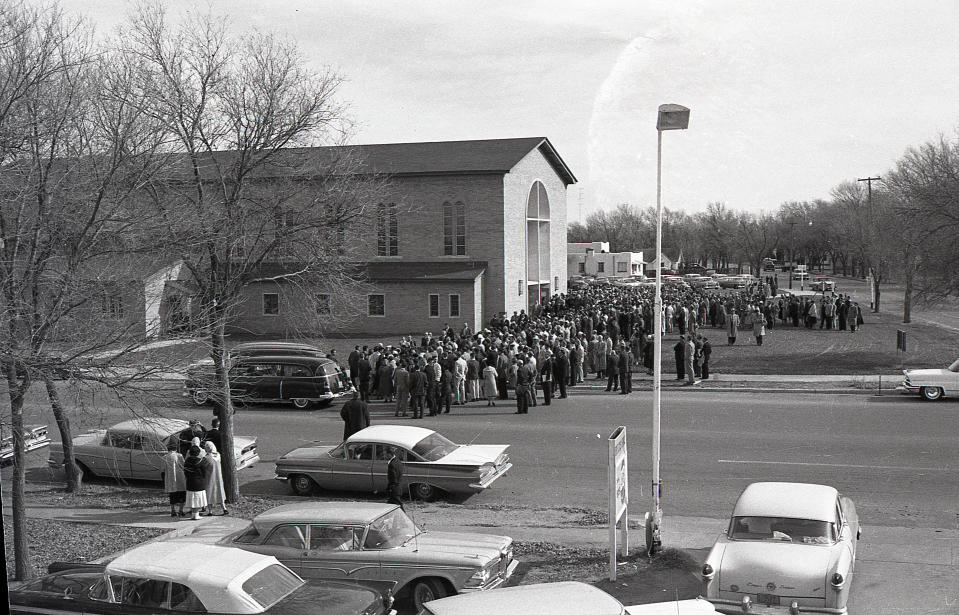Oscar-nominated filmmaker Joe Berlinger on his new 'In Cold Blood' murders documentary, 'Cold Blooded'
In Cold Blood is a classic, bestselling Truman Capote book that begat the “nonfiction novel” genre, while the 1967 In Cold Blood movie based on Capote’s book about the real-life 1959 murders of the Clutter family in Kansas earned four Oscar nominations.
What neither project did: focus much attention on the Clutter family. Both projects concentrated heavily on the killers, Perry Smith and Richard Hickock, former Kansas State Prison inmates who reunited after both were released, and plotted a robbery of the $10,000 that Herbert Clutter had stashed in a safe on the family farm.
Or rather, the 10 grand that Smith and Hickock thought the Clutter safe held. In fact, the wealthy farmers had little cash on hand, but after breaking into their home, the parolees decided that they couldn’t leave any witnesses behind. They murdered Herbert and his wife, Bonnie, and their teenagers, Nancy and Kenyon, cutting the father’s throat and shooting all four Clutters in the head at close range. Smith and Hickock fled the scene with what amounted to pocket money and a few cheap electronics. After a six-week road trip that saw them flee into Mexico briefly, the two were captured in Las Vegas, leading to a Kansas trial and their eventual executions in 1965.

Many more details are known about the killers, including thorough histories of their troubled lives before the crimes. And now, with the premiere of Oscar-nominated, Emmy-winning documentary filmmaker Joe Berlinger’s Sundance TV docuseries Cold Blooded: The Clutter Family Murders, viewers have the chance to learn more about the Clutters, their surviving family members, and the many other people who still live with the aftermath of the brutal crime nearly 60 years later.
Yahoo Entertainment talked to Berlinger — whose Paradise Lost and two follow-up documentaries on the West Memphis Three led to the eventual release of Damien Echols, Jason Baldwin, and Jessie Misskelley, who had been wrongly accused of killing three 8-year-old boys in Tennessee — about why he chose to tackle the topic of the Clutter murders, how the crime and Capote’s book influenced his career years later, and what, sadly, today’s crime coverage has in common with In Cold Blood and the Clutter murders.
Yahoo TV: In Cold Blood was, of course, a wildly successful book, which spawned the Oscar-nominated movie and a 1996 miniseries. Why was this a topic you wanted to revisit in such a deep-dive way?
Joe Berlinger: I revere the book, In Cold Blood. It’s a book that’s deeply influenced my interests in crime, and also my aesthetic style as a true-crime filmmaker. I revere the book, but I’m also keenly aware that the book kind of launched this thing that we’re now in, which is this huge true-crime explosion, and one of the casualties of this genre is that the victim is often left in the margins … particularly in In Cold Blood. I think what [Capote] did so masterfully, which is so brilliant but also created this larger casualty that I’m talking about, is that [In Cold Blood] made literary heroes out of the killers. It humanized them and three-dimensionalized them in a way that I think, in many ways, is positive and productive, because all human beings, even those who do evil, are three-dimensional human beings. Unless you could fully understand how people are, you can’t understand how to come to terms with and how to rectify crime. On the other hand, they became so celebrated as literary heroes — you could say antiheroes, because I don’t truly think people treat them as heroes, but we empathize with them. They are the ones who are remembered … you have sympathy toward them. I don’t think that’s necessarily wrong, but the price that’s been paid is that the Clutter family has been treated as a side note. That is true of a lot of true crime, that the victims … we have such a sometimes prurient interest in crime stories that the victims of crime… Look, I’ve done a lot of documentaries on crime, and that’s why I try to combine a social justice aspect to my crime works, so that there’s another goal, other than just covering a grisly story for people’s entertainment. So I was attracted to the idea of doing this for a couple of reasons. One, the very thing we’re talking about, I wanted to give a different perspective of the crime, give a different perspective of what the family was like, because they feel like they’ve been misrepresented or not represented.

And the other part of it is just, the book hooked me. As a teenager, it was the first time that the assignment in a high school class became something that I went back to that summer and read not once but multiple times, and was fascinated by the idea that crime could be turned into literature.
But my immersion and focus on this subject is all about thinking of the genre that I am in. Thinking about its impact on people, and also respecting and diving deeply into the book that really launched my thinking about this whole space. In Cold Blood, I think, is a brilliant piece of literature, but it comes at a price.
One of the things that jumped out at me again and again while watching Cold Blooded was how little we’ve previously heard about how this crime impacted the surviving family, and the community, the town of Holcomb, Kansas, for decades now. It feels, unfortunately, super-timely, because we hear about horrific crimes sometimes on a daily basis now, and you realize how quickly they turn over in the news cycle. And in that, we often get little information on the victims and the impact of the crimes on their families, their communities.
Absolutely, absolutely — you hit the nail on the head. We’ve already moved on from the Vegas shooting because of the church shooting. Like, who’s even thinking about Vegas right now, sadly? Sandy Hook seems like ancient history. That is the point. This was a unique opportunity to kind of pull back the lens on a story that has affected this family for decades, that was kind of the end of an age of innocence in that town, where you could leave your door unlocked. But we only know about this crime because of this book, and this book told the story in a way that, I think, added to the family’s pain. That was an issue that I really thought was important to explore.

The Clutter relatives have not given many interviews at all in the last 60 years, but you talk to several of them, as well as Clutter friends and neighbors. Were they anxious to finally talk about their loved ones — to dispel, for example, the picture that Capote painted of Mrs. Clutter as this reclusive, detached mother? Were they waiting for the opportunity to talk for a project that intended to explore the crime from their point of view?
I don’t think they were waiting [to talk], but when they saw that something was being done by a team that was going to do the story justice … the 50th anniversary is kind of a magic number. When is the next time to tell this story? I think it felt like it was time to participate, but I don’t think anyone was waiting for their door to be knocked on, you know? They generally felt very violated by how Capote presented everything, and they never heard from him after the book came out. They felt, the family felt, burned by the experience. So I don’t think they were waiting to tell their side of the story. But I think knowing that their side of the story was going to be told, by competent people who have integrity, I think that helped them to decide to, reluctantly, participate.
Were you surprised by anything while making Cold Blooded?
Well, interestingly, as I said, the [In Cold Blood] book threw me into this style of literature, deeply fascinated by the storytelling and the portrait of the killers, and Capote’s own kinship that he felt with both of them, but in particular, Perry Smith. Knowing all that at the time that I first read it produced in me a sense of sympathy for the killers. So that when you either read the book or watch the movie, those final moments, where they’re ascending the gallows, and they’re hung, you have a sense of, not regret, but … you have tremendous sympathy for these people you’ve gotten to know, and what a shame that this is what their lives amounted to.
That’s been my position, but the thing that surprised me about digging deeply into the archives, listening to the confessions, doing the story in the way we did it, is I’ve actually come away with far less sympathy for the killers than I’ve had for decades. Because at the end of the day, I saw little evidence of any kind of remorse, even up to their dying day. So, for me, it was kind of a surprise that my sympathies waned and moved toward the victims’ families and how they were treated and what the story has done to them. The fact that their tragedy has been used in the service of creating a literary movement … I’m glad the literary movement exists. But we must be reminded of the price that some people paid.
Cold Blooded: The Clutter Family Murders premieres Nov. 18 and 19 at 9 p.m. on Sundance TV.
Read more from Yahoo Entertainment:


